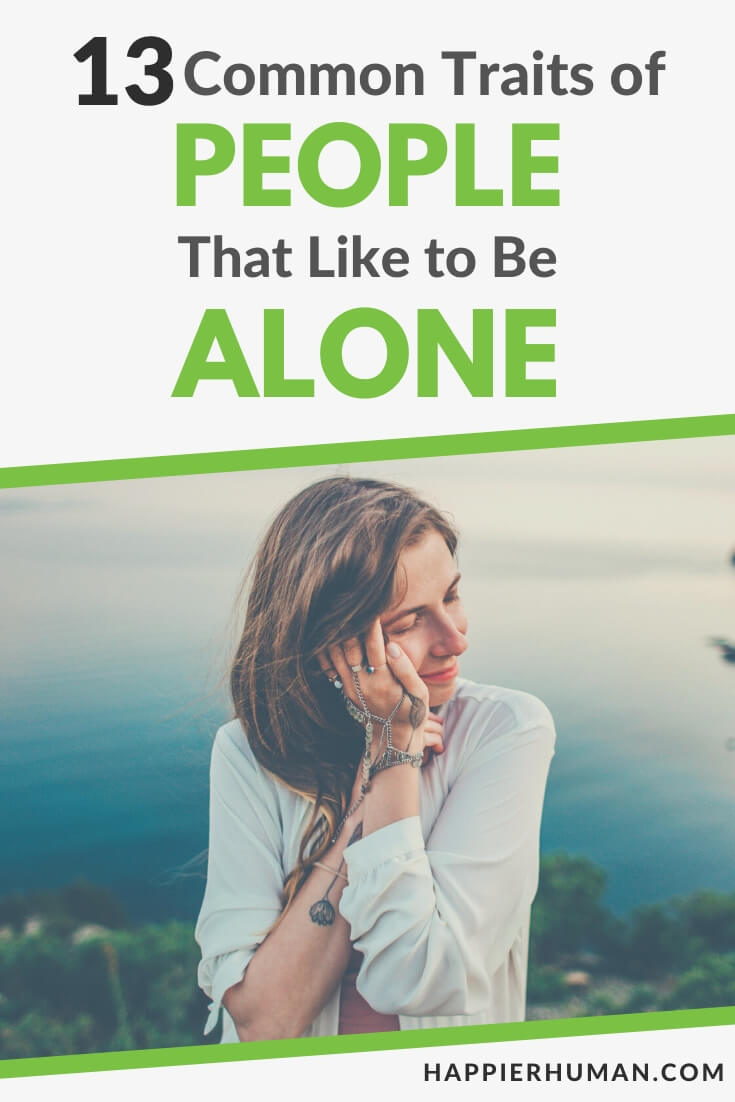Does someone in your life like to be by themselves… and you can’t help but wonder if they are a loner? For one to be certain, they would have to display the behaviors most of the time for them to be classified as true “loners.” That said, I’ve put together a list of 13 ways you can identify people that like to be alone… and it’s not necessarily because they are loners.
Preferring to be alone is not a problem per se. Some people function better that way because it’s their natural psychological makeup. Their persona is a stark contrast to those who are outgoing and energized by social connection. Unfortunately, a lack of social interaction makes others view them as weird or antisocial to outsiders looking in.
Those conclusions aren’t necessarily fair or accurate, as people with introverted personality traits are some of the most brilliant and successful people.
With that said, let’s take a look at how you can tell someone likes being alone, types of loner personalities, and the potential effects of social isolation. Learning why some people stay to themselves can help you to understand and interact with them in a more empathetic way.
Does wanting to be Alone make someone a “Loner”?
A loner, also called a ‘homebody’, is someone who prefers spending time alone instead of with other people. They’d rather take a stroll in the woods by themselves than go to a concert where there’s a crowd.
Loners also rely heavily on themselves and are less inclined to ask for assistance. At the extreme end of the spectrum are loners who cut themselves off from society. They’re called hermits and avoid interacting with people at all costs.
Interestingly, choosing to be alone doesn’t always equate to being a ‘loner’ in a negative sense. Furthermore, it shouldn’t be a problem if someone opts out of socializing. They have the right to choose a lifestyle that brings them satisfaction and joy.
In fact, their loner tendencies could be a reflection of their core personality. For example, the Sigma male, also called the ‘lone wolf’ lives and thrives in solitude. However, homebodies are often viewed in a negative way and labeled as ‘socially awkward'.
Is Being Alone Too Much a Bad Thing?
The answer depends on the underlying reason as to why the person wants to be by themselves. Straight away cutting themselves off from society, e.g., moving away to a secluded mountain isn’t healthy.
Physically healthy, able-bodied individuals may also socially isolate themselves right at home for extended periods of time, just the same as those who seclude themselves.
As humans, we generally want to live near people and be able to socialize when we feel like it, even those of us who love our solitude. Socially disengaging almost completely is a form of chronic social isolation. It can signal a mental health condition such as social anxiety, loneliness, depression, or low self-esteem.
Additionally, the person may lose a sense of connection and community and begin seeing the world differently. This can lead to a deep mistrust of people, a common behavior observed in individuals with paranoid personality disorder (PPD).
Aloneness as a choice is different from feeling lonely, also called loneliness. Being alone is a physical state of being. Loneliness is a feeling or emotional state and can persist even when you’re surrounded by people. It’s also a mental health condition linked to extended social withdrawal or isolation. Depression, anxiety, and suicidal thoughts may result from loneliness.
5 Types of Loner Personalities
As the online world becomes the preferred way to socialize, more people find themselves alone, although unintentionally. A 2021 study suggests that 31% of US individuals between the ages of 16 and 74 consider themselves loners or feel lonely. That figure was less (30%) in 2018, according to a report by Our World in Data. However, all loners aren’t created equal. Here are the five types:
- The Intentional Positive Loner: Refers to people that like to be alone because they feel better by themselves or embrace a different value system. For example, they may stick to themselves to avoid toxic people or drama.
- The Intentional Negative Loner: Avoid people for negative reasons, e.g., they have a negative view of people, fear rejection, think negatively, or engage in negative self-talk. These traits may be linked to antisocial personality disorder (APD). Intentional negative loners may also stay away from others because they catastrophize (expect the worst possible things will occur).
- The Unintentional Loner: They are eager to socialize but may lack the social skills needed to maintain positive long-term connections with others. They, too, may have a sense of social rejection and engage in negative self-talk.
- The Short-Term Loner: They want to be alone sometimes, but not for too long. They’ll socially disconnect for a while to rebalance and rejuvenate mentally whenever they feel socially drained. If they don’t distance themselves, they’ll feel irritable or distressed.
- The Long-Term Loner: These individuals desire to be around others but socially disconnect for a prolonged period for one reason or another. Being alone for lengthy periods eventually becomes normal, leading to chronic loneliness, anxiety, and depression.
13 Common Traits and Characteristics of People Who Enjoy Being Alone
Below are some common personality traits and behaviors of people who prefer to maintain a healthy distance from others, for positive reasons. In other words, intentional positive loners.
The more traits they exhibit, the more likely they might be a loner. Keep in mind that these traits don’t mean your friend, co-worker, or loved one is weird or mentally ill and shouldn’t be stereotyped that way. They’re just like any other person except that they treasure solitude more than anything else.
1. They are Introverted
Introverts are frequently seen as antisocial or socially awkward. What people don’t realize is introversion is a personality trait opposite to extroversion. Introverts choose to be loners and get their stimulation from peace and quiet. Extroverts are wired differently and require stimulation from outside themselves.
Loners with introverted traits replenish themselves through spending time alone. They’re able to concentrate better, reflect, and brainstorm possibilities. Make no mistake, they aren’t sitting idly wallowing in self-pity or feeling rejected by society. In fact, they throw solo parties.

I’m an introvert with Introverted Sensing Thinking Judgment (ISTJ) personality traits. I discovered my personality type after taking a Myers-Briggs Personality Indicator inventory online.
I chose to work from home and pretty much live in a “bubble” where I feel safe and protected by established boundaries. I boost myself up daily by listening to my favorite songs and dancing in my kitchen. I’m sure other loner introverts can relate.
2. They are Highly Independent
People that like to be alone for positive reasons tend to be highly independent. I suppose they’re forced to be this way since they aren’t usually around people they can ask for help.
Even when around others, independent loners can carry on with their lives and get things done on their own.
Their independence is also obvious in the way they think and make decisions without input from others. It’s not that they’re arrogant. They don’t mind listening to what you have to say. It’s more of a self-confidence thing.
They trust themselves to make the right and best decisions for themselves. In times of distress, they are capable of emotionally comforting themselves. It’s a part of their emotional independence.
3. They Enjoy Doing Things by Themselves
Unlike outgoing people, such as Alpha personalities, who need constant social connections to feel alive, those who like to stay to themselves actually enjoy doing just that.
It gives them a chance to do whatever they like without needing to worry about who’s watching or judging. They’ll sit and watch a movie or read a book. Outdoors, they may go shopping or walk in the park without anyone tagging along.
Even though it may seem strange to others, they don’t mind eating dinner alone at a restaurant or taking a solo vacation. You might feel pity for them, thinking they were stood up.
Why else would they be socializing by themselves, right? These individuals are comfortable in their own skin and are actually enjoying themselves. You should see the odd look my friends gave me when I told them I wanted to vacation by myself.
4. They Value Time
People who enjoy spending time with themselves value and respect time. Time is a scarce resource that shouldn’t be wasted and they are aware of that.
Time is viewed as an asset that can lead to greater success if it is used wisely. They think going out to socialize just for the heck is time-wasting.
They’d rather stay at home or somewhere quiet doing something constructive, like journaling their thoughts to enhance self-awareness.
Similarly, they are considerate of other people’s time and won’t keep you waiting if they know it’s not practical to be there. They’ll prefer to respectfully decline or ask for a rain check.
5. They are Self-Reliant
Those who intentionally take the lone path tend to be self-sufficient. They rely on themselves heavily for physical, financial, and emotional support.
They’re able to self-soothe and improve their mood on their own. They’ll rather do so than call up a friend and burden them with all of their problems.
It’s difficult to tell when they are distressed and in need since they’re able to manage their emotions well. Although alone most of the time, they do tend to have a positive mindset which helps them find healthy ways to solve their problems.
Being self-reliant also keeps them from getting enmeshed in a codependent friendship or relationship.
6. They are Deep Thinkers
These individuals are deep thinkers, which can translate to being highly intellectual depending on how much they seek knowledge. Retreating to their quiet space allows them to focus on personal and professional goals.
They’ll brainstorm ways to develop themselves, increase productivity and income, and increasingly become the better version of themselves.

Because they live consciously aware, they know that self-growth can increase their chances of personal and professional success. So, the next time you see your loner friend or partner deep in their thoughts, worry not.
They’re not necessarily sad or worried. As if in a chess match, they are more than likely strategizing their next move.
7. They are Comfortable in Their Own Skin
Those who choose to be alone usually have a smaller circle of trusted family members, friends, and confidantes. Despite that, you won’t see them congregating often even within their protected social circle.
They are comfortable, happy, and content in their own space and may only seek external stimulation at intervals.
Usually, it’ll be an important occasion like a birthday celebration, wedding, or graduation party for someone in their circle. They attend to show love and support and will have a jolly good time. Once the fun is over, they withdraw back into their comfort zone.
8. They are Self-Loving
We all deserve to love ourselves, but many people are unable to make that connection with themselves. When I said loners and introverts (like me) enjoy their own company and are comfortable in their own skin, it was to convey that sense of self-love they have.
But not because they love themselves and spend a lot of time in solitude means they are selfish or self-centered. Self-love is a sign of self-compassion, and those who are self-loving are usually loving and empathetic toward others. It’s not in their nature to turn their backs on loved ones and they’re certainly fine with helping out a stranger.
9. They Avoid Drama
Individuals who like to stay home and mind their own business do so for a reason. It minimizes potential conflict and drama. They’re not known for calling up friends to gossip and badmouth others. Small talk isn’t attractive and is considered a time-wasting activity. This is in contrast to people who like to gossip and stir up drama within their social circles.
Since people that like to be alone are allergic to toxicity, they will choose their friends very carefully. If someone acts up, becomes disrespectful, or disregards their boundaries, they aren’t afraid to cut them loose. They will remain loyal only to those who are loyal to them.
10. They Have Firm Boundaries
Even though they have a loner personality, they still find themselves surrounded by people at home, school, work, or while out and about. They see the wider society as an integral part of human existence. Therefore, they aren’t afraid of social settings or experience social anxiety.
However, they have strong personal boundaries limiting where they go, what they do, and how others interact with them. Healthy boundaries help protect them from people with toxic personality traits that can upset their need for tranquility and overall well-being.
11. They are Self-Aware
Spending a lot of time enjoying their own company gives homebodies lots of opportunities to self-reflect. There’s time to process their thoughts, feelings, and emotions and assess their actions. In fact, practicing self-reflection makes them more aware of their inner selves and the world around them.
Having a better understanding of who they are helps them make better choices, communicate their needs more effectively, and live happier more successful lives.
Self-aware people tend to discover their purpose far more quickly than those who aren’t living consciously aware. Given the right resources and opportunities, they’re able to fulfill their perceived life purpose.
12. They are Autonomous
Those journeying through life solo have a natural ability to govern their own lives. They make decisions independently and live according to their own rules, beliefs, and desires. Their sense of autonomy enables them to work and maintain high productivity levels with little supervision.

They’re able to manage their own schedule and stay on task. They can stay focused and do capitalize on the freedom they have to get the job done with a greater degree of freedom. Because of their solitudinarians, they tend to be more productive in settings where people aren’t around to distract them.
13. They are Level-Headed
The ability to maintain their cool in the midst of challenges is something that’s quite striking about intentional loners.
The ability comes from the resilience they develop from being independent and self-reliant. Keeping a level head doesn’t mean they don’t get stressed, overwhelmed, or anxious in certain situations.
Self-awareness and living mindfully allow them to manage and regulate their emotions when confronted with setbacks or conflicts. Instead of losing it, they will immediately start thinking of the best and most positive ways to cope with the circumstances.
Healthy coping skills help minimize the chance of them engaging in maladaptive behaviors, such as alcohol drinking and drug use, to make themselves feel better.
Final Thoughts on Traits of People That Like to Be Alone
Think of people who willfully stay to themselves for positive reasons as those who want to achieve more and live happier. There’s nothing wrong with that, providing it’s not interfering with their mental health and day-to-day functioning. Besides, they have no problem socializing. However, too much of it comes with its own problems, such as lost time and potential disagreements they’d rather avoid.
Those choosing to live solo don’t need to be the life of the party or feel they have to prove themselves to the world, as extroverted people do. Sitting by themselves and being preoccupied with their thoughts or doing something creative is far more appealing.
I’d say people should embrace them as they are, as in most cases, their desire to be alone is likely not an issue. In fact, they might consider you a threat to their solitude and distance themselves from you if you try to change them. Do you know there are at least 9 Benefits of Being Alone & Doing Things on Your Own? Keep reading to find out what they are!
Finally, if you want to identify YOUR personality type, then take one of these 11 personality tests to better understand what makes you tick.


